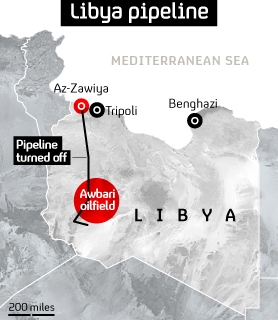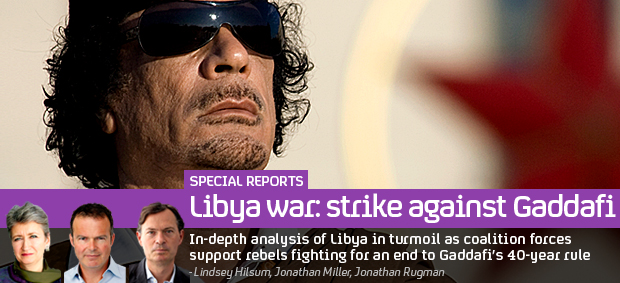Tripoli pipeline attack ‘endgame’ for Gaddafi
Colonel Gaddafi’s regime in Libya could be entering a final, decisive phase, with reports that the main pipeline supplying oil to Tripoli has been cut.
Sources inside Libya have confirmed a Reuters news agency report last week that rebels had severed the pipeline that connects the Awbari oilfield in southern Libya to the Az-Zawiya refinery outside Tripoli.
A spokesman from the Benghazi-based rebel Interim National Council is quoted as saying that the aim is to “drain Tripoli”.
There are also suggestions that anti-Gaddafi forces have managed to cut the gas pipeline used for power generation in Tripoli.
The Az-Zawiya refinery is still working, which suggests there is a store of crude oil to supply the Libyan capital. However, it is thought only to be producing at one-third capacity at present.
The only option is to squeeze Gaddafi out of resources – and the most important of those is fuel. John Hamilton, African Energy
John Hamilton, contributing editor for African Energy, believes this could represent the start of the endgame for Colonel Gaddafi and his supporters.
“If you take the view that the rebels can’t defeat Gaddafi militarily by invading Tripoli, and that Nato can’t defeat him from the air, then the only option is to squeeze him out of resources – and the most important of those is fuel,” he told Channel 4 News.
“The rebels seem to have made a definitive decision that they want to cut off Gaddafi’s supply of gasoline, in particular. And the logic is that, having cut off the pipelines, they would also do their best to stop road transport.”

But it is almost impossible to assess how much crude oil the regime has in storage, which makes it hard to estimate how long Colonel Gaddafi can continue to enjoy popular support in the west of the country.
“The difficulty with the Libyan power sector,” says John Hamilton, “is that there is no data. It’s impossible to say with any degree of certainly how much power is being used, what will happen, and how many power stations they need still to be operating.”
Yesterday Luis Moreno-Ocampo, prosecutor at the International Criminal Court in the Hague, suggested that the Libyan leader’s days were numbered.
“I don’t think we will have to wait a lot. I think if we have enough energy within the states – in two or three months it is game over.”
On Wednesday the Foreign Secretary, William Hague, told the House of Commons the first international aid payment of $100m had been made to Libya’s Interim National Council.
Donors pledged more than $1.3bn to Libya’s rebels at a meeting in the United Arab Emirates earlier in June.
Whitehall prays Gaddafi doesn't leave to soon
William Hague in the Commons tried to rubbish claims that the government only had 12 officials working full-time on post-Gaddafi Libya. But listen to his answer and he says there are "dozens" of officials "connected" with this work, writes Political Editor Gary Gibbon.
Around Whitehall I found an official involved in all this talking of the risks of "catastrophic success" and a minister with knowledge of the level of preparation who says he "prays every night" that Gaddafi doesn't go too quickly.
One Government source said Nato advice was to expect trouble after Col Gaddafi - "blood-letting not bloodbath" one official put it. Another Whitehall source talked about how a lot of the Difid effort so far was going into trying to identify who currently runs key pieces of Tripoli infrastructure - transport, hospitals, security etc - so that they can be contacted and persuaded to stay put (in most cases) if and when Col Gaddafi goes. The government is acutely aware of the Iraq mistakes…
Read more from Gary Gibbon on the Politics Blog
-
Latest news
-
Taylor Swift’s new break-up album breaks records3m

-
NHS trust fined £200K for failings that led to death of two mental health patients3m

-
Sunak vows to end UK ‘sick note culture’ with benefit reform3m

-
‘Loose talk about using nuclear weapons is irresponsible and unacceptable’, says head of UN’s nuclear watchdog3m

-
‘There wasn’t an Israeli attack on Iran,’ says former adviser to Iran’s nuclear negotiations team7m

-





